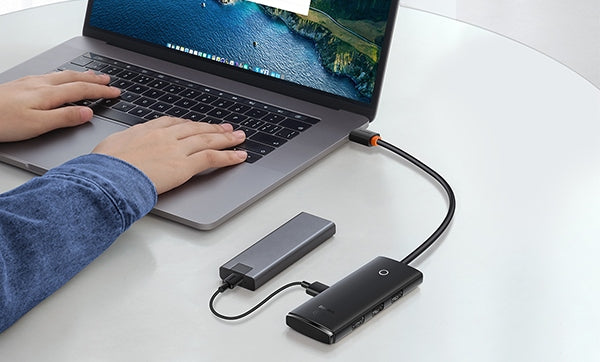Was your smartphone shipped without a boxed adapter? Did you lose your original smartphone charging adapter? Or is the smartphone charger worn out to the extent that it cannot effectively charge your phone? If you face any of the above scenarios, it’s time for you to purchase a new one.
Nowadays, you need to learn about chargers and your device before buying one. You need to consider many power varieties, brand-specific terminologies, charging standards, and cables to choose the right charger for your smartphone.
When purchasing a charger or an adapter, you should keep in mind several things, from power requirements to charging standards. Inserting the charger and noticing the charging or fast charging notification isn't enough. As a consumer, you would need to learn more so you can ensure that you buy the right adapter and charge your handset properly and maintain its battery life.
But fret not! We are here to help you learn more about choosing the right smartphone charger for your device. By the time you're through with this post, you will have all the right information on how to choose the right charger for your smartphone.
Quick Overview
Choosing a charger doesn't just involve walking into an electronics shop and selecting a unit that appears to charge your phone. Most of the time, sales people don’t really know enough about smartphone devices to recommend the correct chargers for you.
You need to learn about various factors to ensure you take home the right charger. Here’s a quick rundown of what you should know.
1. Know How Much Power You Need In Watts
What is the power rating of your smartphone in watts? You can find this specification listed on the phone manual or specification sheet, typically found with the box when you first bought your phone. Some phones have a sticker behind them that indicates the power rating. Typically, smartphone power ratings vary between 18-65W.
You must ensure that the rating on the phone corresponds to that of your selected charger. If you don’t have the box that comes with the phone or the manual, just know the model of your phone and search its specs online. You can find it on manufacturers’ websites.
2. Learn About The Charging Protocol Supported By Your Smartphone
The next and critical thing to consider is what charging protocol your handset supports. If the handset is proprietary, you will have to purchase a first-party charger. However, universal standards like USB PD (power delivery) aren't so restrictive and open the door to several third-party options.
3. Choose A Charger Matching Power Requirements and Your Device's Charging Standards.
Any electrical device, including your smartphone, has a power rating in which it optimally operates. Ensure that the charging standards supported by your device match that of your chosen charger to have a seamless charging experience.
4. Check the Ports
Are you planning to use a single charger for charging multiple devices? Ensure you double-check the unit to see if the ports support the necessary standards on your gadget. You also should ensure the charger can share enough power on all the ports.
Now that you've had an overview of what you should do to buy the right charger, read on for in-depth learning about the things you need to consider.
Phone Charging: Here's What You Need to Know

So, what should you know when charging your phone?
When you're picking out your travel adapter, power bank, wireless charger, or charging hub, there are two primary things you ought to keep in mind.
Power Requirement
Your phone’s power consumption is the first thing you need to consider. Luckily, you don't need to go mathematical about it.
Smartphone and charger manufacturers often include the maximum power rating the device can hold on the specification sheet.
Generally, smartphones' maximum power ranges between 18W to 65W. Hence, select a charger that at the least matches the rating on your device.
Charging Standard
You should consider the charging standard that the gadget requires to obtain the level of power discussed above. However, it might be challenging to select the right standard because devices often support multiple standards offering varying power capabilities.
For instance, super-fast-charging smartphones use proprietary standards to offer high power levels. The good thing is that most of these devices are shipped with chargers.
However, if you consider purchasing a power bank or multi-charging hub, you still have to know the device's fallback charging protocols.
A plug has the right amount of power and the right protocol for fast charging to work properly. Generally, charging standards for various smartphones fall into three categories: USB PD, Proprietary, and Legacy chargers.
1. Universal Power Delivery (USB PD)
This is the primary USB-C charging standard for smartphones. Although USB PD comes in some backward compatible models, you should determine if your phone needs the advanced PPS protocol. The Quick charge 4&5 from Qualcomm is backward compatible with the USB PD standard, which makes them also universal.
2. Proprietary
The OEM-specific charging standards help get higher speeds compared to USB PD when used. The support is normally limited to the plugs and products with a certain company. Therefore, you will rarely find any support in third-party hubs and plugs.
3. Legacy
Some pre-USB-C charging standards still exist in the smartphone charger's marketplace and older phones and lower-powered devices. These charging standards include Samsung Adaptive Fast charging, Apple 2.4A, and Quick Charge 3.
Although these charging standards are gradually being phased off the market, they are occasionally still used as a fallback protocol for newer modern handsets like Samsung smartphones and Apple.
So, how can you fast-charge your smartphone? The magic formula lies in purchasing a plug that supports the necessary or required charging standard(s) while providing sufficient power to the gadget too.
How to Choose the Right Charging Standard
Considering all the above, if your smartphone is using a proprietary charging standard or is shipped with the adapter, you will have the fastest charging speeds, that is, when you use the plug that's provided. Otherwise, you could also use a similar plug with the same power rating from that brand. You can also reuse plugs from older devices where possible. Hence, before heading to an electronics store, try the plugs from those older devices.
However, if your smartphone doesn't ship with a charger, ensuring you've got the right or current charging standard can prove challenging. It might be the same case when searching for a power bank or a charging hub that pairs nicely with your gadgets. So, where do you start the search? Well, look no more than the manufacturers' specification sheet. However, there aren't enough guarantees to use your spec sheet. Some spec sheets don't list the charging standards necessary/required.
Read more: Ultimate Guide to USB Type-C: Here's Everything You Need to Know

Baseus is a leading smartphone charger manufacturer, producing various modules with different specifications.
Featuring the GAN5 and GAN5S technology that enables the Baseus chargers to be powerful and super fast. They conduct higher voltages than silicone chargers over time. GAN3 is an improvement of GAN2 and provides better improvements in power transfer, charging speed, and heat dissipation.
Baseus chargers come in maximum power of 65W and 140W. However, they can be used for charging various electronic devices, from smartphones to laptops. For instance, the Baseus GaN3 Pro 65W US Black Desktop Powerstrip has a maximum power rating of 65W. It features two USB-C PD ports, dual AC outlets, and 2 USB-A ports. This charger can intelligently deliver electrical power to a maximum of 6 devices simultaneously.
The other notable model is the Baseus GaN2 Fast 100W 1C charger that includes multiprotocol certified cable. The unit is 40% smaller, featuring a GAN2 Qualcomm quick charge 5.0. It also has a heat dissipation of up to 500F. The power delivery for this charger is up to 100W, which allows for adaptive fast charging. It can be used for charging smartphones, Chromebook, and other laptops.
Baseus also produces the Compact Quick 2U+C 30W Charger. This unit features the BPS intelligent power allocation. It helps you save the charging waiting time by up to 60%. This is all thanks to its shared charging system. You can charge about three devices simultaneously through BPS intelligence power allocation.
Testing Your Device's Charging Power
Have you bought a charger and feel you are not getting the fastest speed? The only way to diagnose the charging power of your phone is through testing.
There are several ways of doing this; some are free, while others require some hardware. The simplest method is to use an application that can give you accurate charging information for your battery.
Some of the best choices for listing the current and voltage or battery monitoring are Ampere and Accubattery. The other greater choice to test the charging power of your device is Inward. It calculates the power automatically. However, you can install and use a USB-C power meter for reading the real voltage and current.
Conclusion
Purchasing or picking a charger isn't as straightforward as some think. As seen above, there are several things to consider to ensure that you choose the right unit. You want a unit that matches your handset's power rating and charging standard for the best results.
Follow our practical guide to make sure you’re getting the right charger for your device. Baseus is a leading manufacturer of fast chargers, especially those featuring the GAN technology. Most of Baseus' adapters are multi-port, meaning that you can conveniently fix several gadgets simultaneously. This convenience saves you some time.
Found this article useful? Make sure you sign up to Baseus' newsletter for more tips, how-tos, exclusive deals, and discounts!
 United States/English
United States/English






